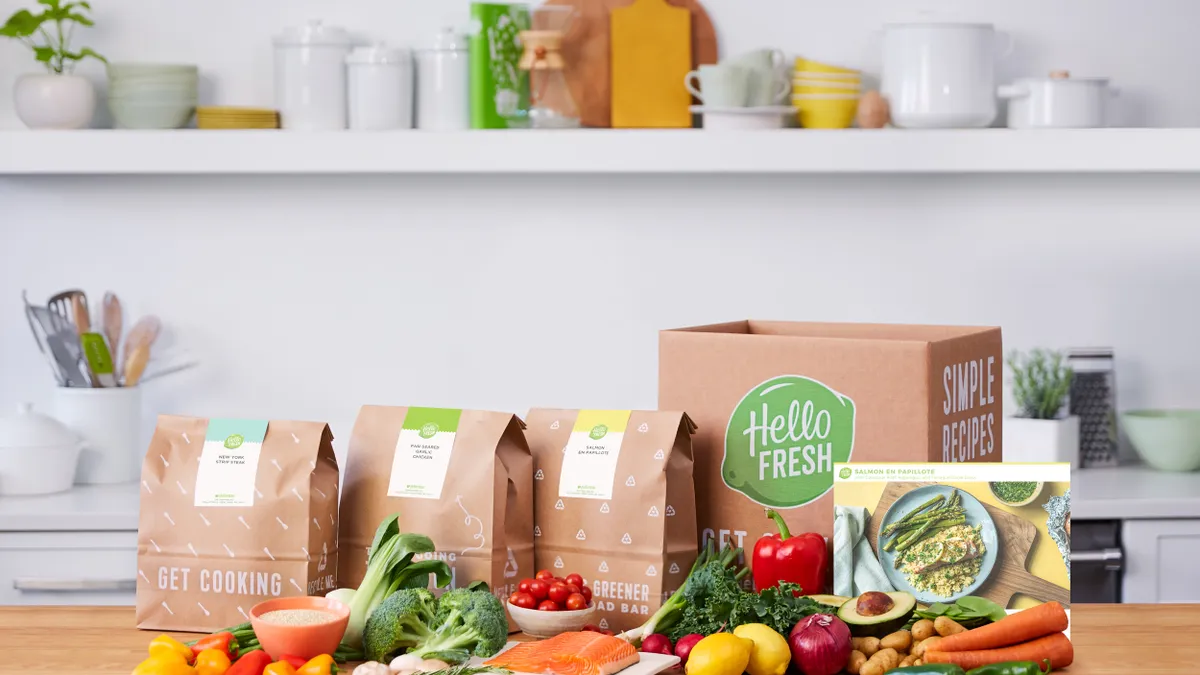Dive Brief:
- HelloFresh will begin selling its meal kits this Wednesday at nearly 600 Giant and Stop & Shop stores owned by Dutch grocer Ahold Delhaize, according to The Wall Street Journal.
- HelloFresh Chief Executive Dominik Richter told the newspaper that while it will depend on online business to drive sales, retail will play a role in helping it acquire new customers. “It’s for customers that don’t have the ability to preplan as much,” Richter told The Wall Street Journal. “We think this is an offering that is very complementary.”
- Richter said the company is in talks with other retailers to carry their meal kits in stores.
Dive Insight:
Once relegated to home delivery, meal kits are increasingly gaining a bigger presence in retail outlets. Kroger acquired meal kit maker Home Chef last month while Albertsons purchased Plated last September. Walmart started offering three different styles of meal kits, which vary according to preparation time, in March. And beleaguered Blue Apron announced in May that it was launching a pilot program with Costco to carry its product, as part of an effort to expand the brand's reach across more households.
For Ahold Delhaize, the partnership enables the Netherlands-based grocer to try the meal kits at a fraction of its more than 2,000 U.S. stores before deciding whether to roll them out to other banners like Food Lion, or into its grocery delivery business Peapod. The lure of supermarkets carrying meal kits is to offer customers another way to purchase food; people could stop by for milk, bread or eggs and grab a pre-made kit on their way out for dinner.
The partnership with Ahold Delhaize could potentially be a big win for HelloFresh, which has rapidly expanded its American operations and recently overtook Blue Apron as the market share leader in U.S meal kits.
While Blue Apron has vowed to boost its reach in part by working with retailers, there are few major supermarket chains that don't carry their own meal kits or have partnerships with a provider like HelloFresh to offer them. The result is that Blue Apron has few major grocers left it can partner with, leaving it to seek out companies that have a smaller store base unlikely to meaningfully help in terms of growing brand recognition or revenue. At the same time, The Wall Street Journal noted that HelloFresh is in talks with other grocers, too.
It's clear that the mass migration of stores selling meal kits is well underway, and the ongoing push is unlikely to wane anytime soon. Even though meal kit providers will continue to grab the lion's share of their revenue from the home delivery method they are synonymous with, they realize there also are benefits to having their product in stores. The strategy helps boost sales and increases their identification among customers, thereby separating themselves from their competition in the crowded space. It also enables meal kit makers to have bigger scale, which will help improve margins and get a better return on their marketing expenses.
HelloFresh has become the leader in the $5 billion U.S. meal kit market by focusing on regional cuisine, vegetarian cooking and special diets like its competitors. But it has separated itself from the smaller players on spending and data science. The company also has a "one pot" cooking line, a global cuisine line and offerings that require just 20 minutes of prep time. In March, HelloFresh increased its focus on specialty diets by acquiring Green Chef, increasing its offerings and giving consumers more reasons to seek it out.
Its partnership with Ahold Delhaize is the latest effort by HelloFresh to make it top-of-mind with shoppers, whether they seek it out online or in the store. In the ultra-competitve meal kit space, success is unlikely to come from dominating one segment like home delivery, but by offering consumers a variety of products that meet their needs and doing so whenever and wherever they want it.










